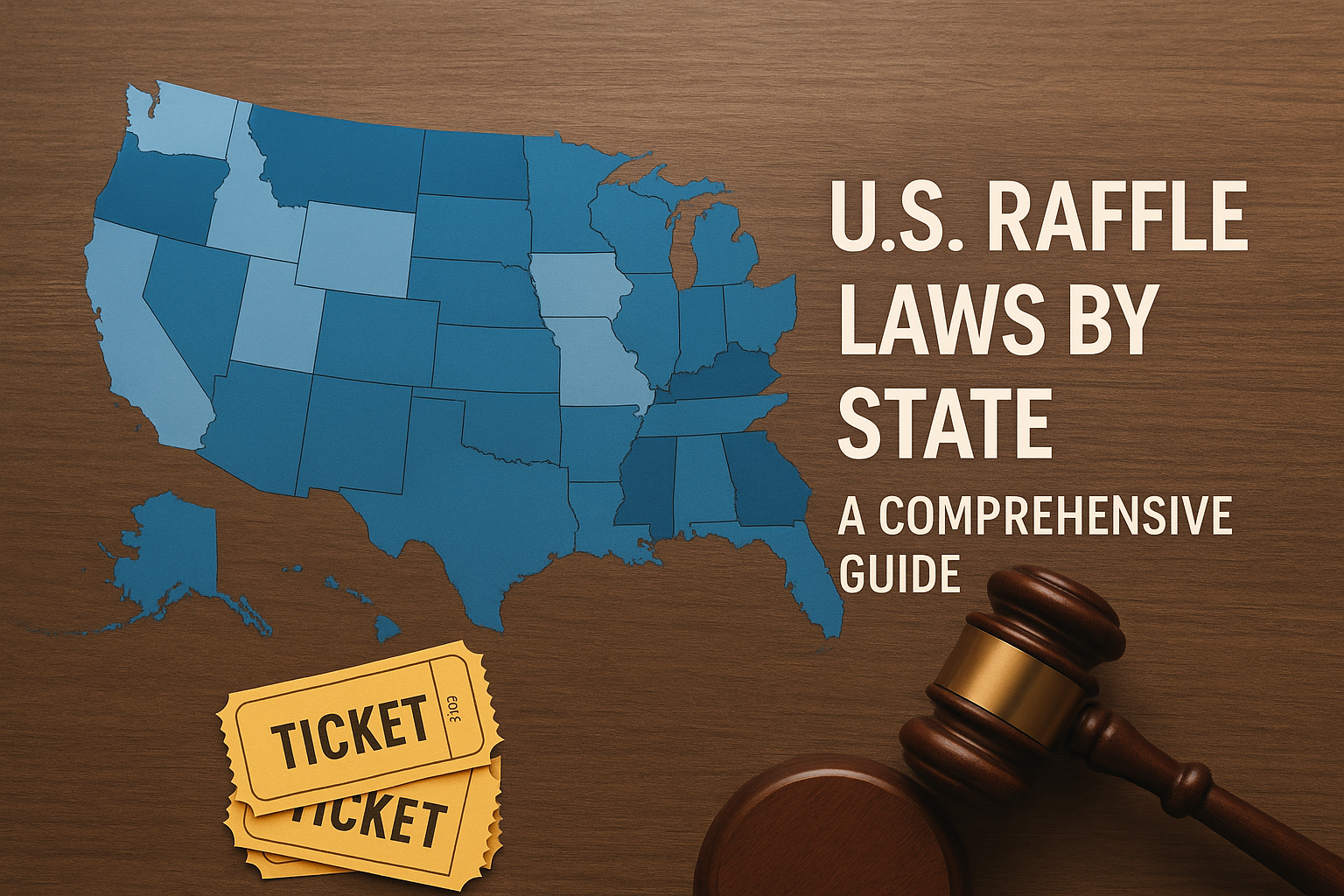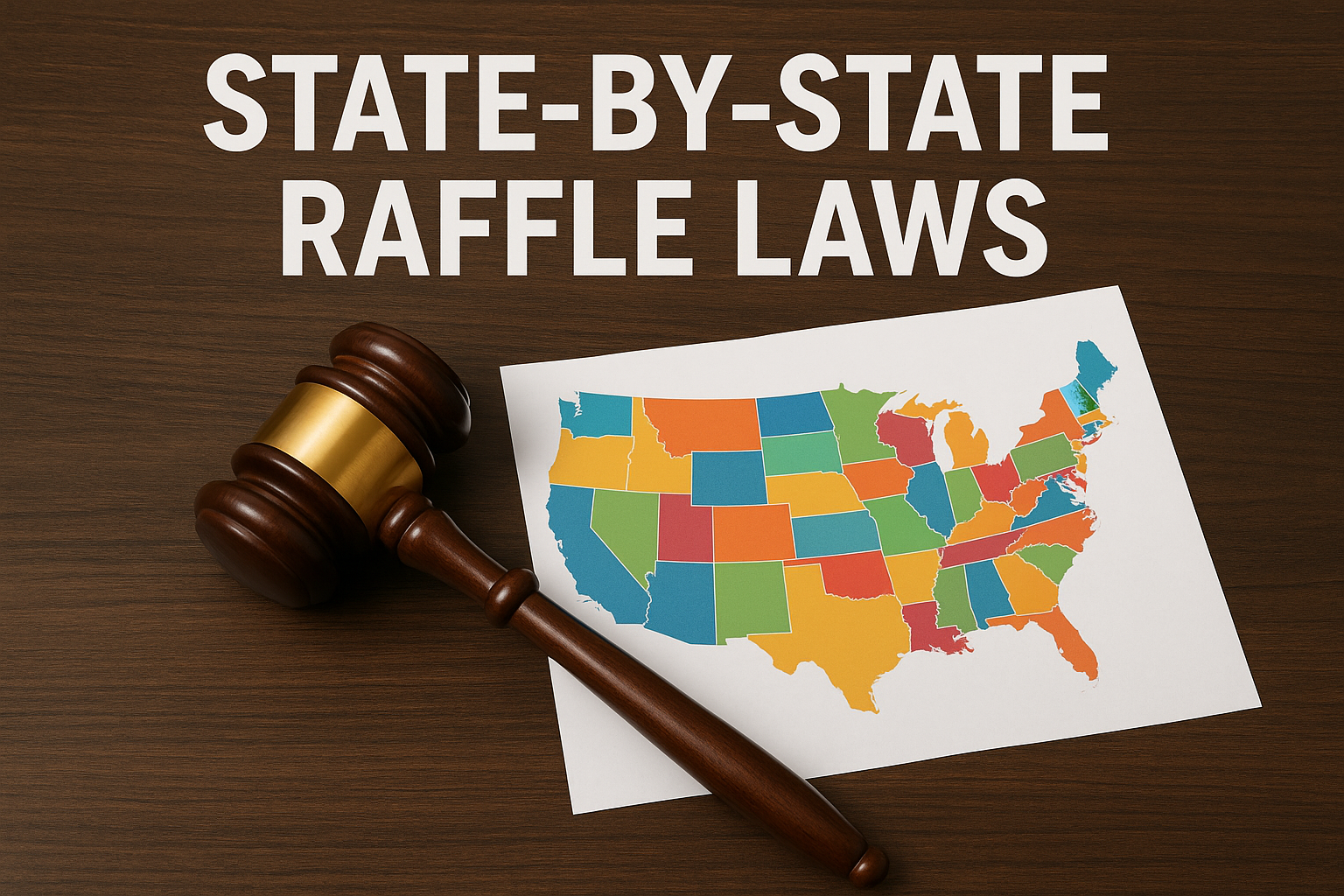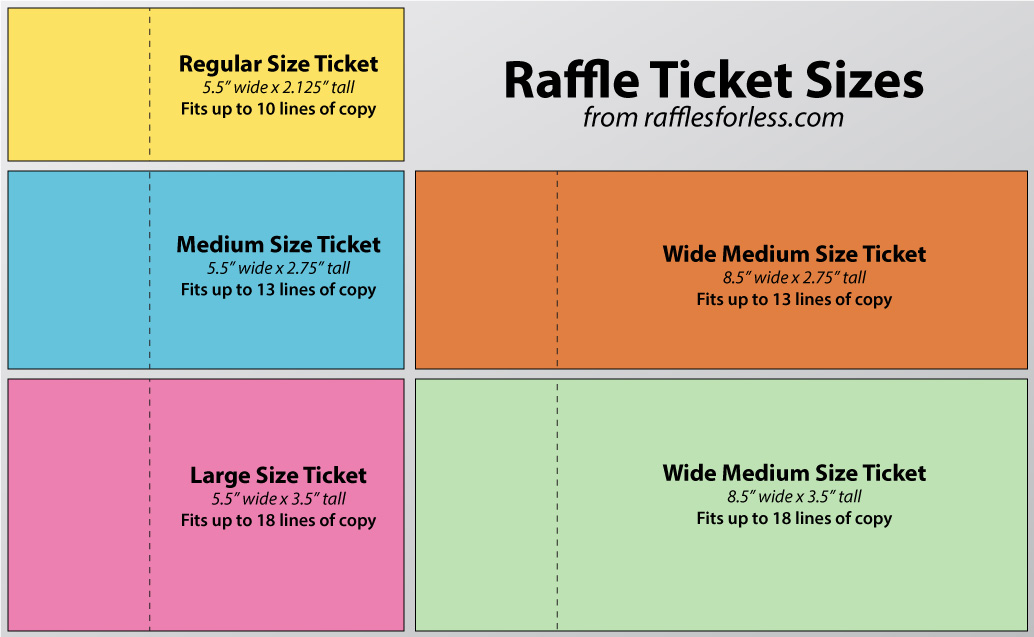Every time you see a raffle ticket, this question crosses your mind: “Is this even legal?” Especially since raffle rules change from state to state. Is raffle gambling? Yes, cause a raffle is a raffle ticket. You pay for this ticket to enter a chance to win a prize by random drawings, and in legal language, that’s something that you call gambling. But each state treats raffles differently. Some argue that they are a simple fundraising tool for nonprofits. In contrast, others prohibit them unless they fall under specific rules and regulations.
Why do the rules for raffles change depending on where you live
- Gambling Regulations Vary: Each state has its own thresholds and definition of what is illegal gambling. Some states view them as a healthy fundraising activity and issue permits to individuals for specific events, while others ban them entirely.
- Permissions Based on Organization Type: Most states let 501(c)(3) nonprofits or similarly qualified groups run raffles, but often only registration and licensure.
- Limits on Prizes, Ticket Prices, and Format: Some states regulate and have specific rules for prize values or ticket prices. Some states prohibit the online sale of tickets, and others ban cash transactions.
- Local Oversight: In some places, it’s not just the state making the rules; even your county or city might have its own. That’s when things start to get a little more complicated.
Federal vs. State: How Raffles Are Regulated
In the U.S, the federal government stays out of the racial situation most of the time. This can be surprising for some people because most think there is one rulebook for everything. But to surprise you, Raffles don’t work that way.
Gambling laws are handled by the state government, and as raffles are considered a type of gambling, the raffle laws come under the state level. This means that each state has the right to decide whether it allows raffles, who can run them, and under what conditions. Some states are really chill with raffles and let people run nonprofits without much red tape, whereas others are a little picky about it and have tons of requirements, permits, and restrictions.
It’s not just that; like every state, county, and even city can have its own local rules for raffle laws, so you need to be careful in this business. If it’s totally fine in one town, it can be totally banned a few miles away.
If you are starting a raffle business, here is what you need to keep in mind: there is no single rulebook that covers the whole country. Every state has its own set of raffle laws, and in some places, even in your own area, there might be extra rules.
That’s where we come in, Raffles for Less, to take the headache and inconvenience out of the way. We don’t want you to stress over whether you are following raffle laws or not; instead, we want you to invest your energy in raising money and arranging fun events. We are here to keep things simple for you so you can make it exciting.
General Rules for Raffles What You Should Know
Operating a raffle is easy. Print tickets, sell them, and select a winner. However, in America, there are a few simple guidelines that nearly everyone must remember.
- Licenses:
In most states, you can’t simply hold a raffle without permission. You may be required to obtain a raffle license or permit before selling tickets. It’s kind of like getting a hall pass; it’s the official thumbs-up that keeps your event in good standing and ensures its legality.
- Nonprofit Restrictions
Here’s a doozy: in most states, raffles are a form of gambling. That means only specific groups, typically nonprofits, schools, churches, and charities, can hold them. If you’re a business or private individual, you won’t be eligible to host one.
- Age Limits:
Similar to casinos and lotteries, most states have age limits on raffle laws. That typically translates to no sales of tickets to minors. However, the specific age limit (18 or 21) may vary depending on the location.
Ultimately, these regulations aren’t intended to complicate life for organizers; they exist to ensure that raffles remain fair, open, and clearly aimed at raising funds for worthy causes. And that’s why Raffles for Less is here: to provide you with a simple, low-cost method of conducting your raffle correctly, without all the confusion.
State-by-State Raffle Laws
Every state in the U.S. has the right to have its own raffle law. Some of them are really easy to follow and open raffles freely, while others come with huge files of rules and restrictions. There are also a few that don’t allow raffles at all. We provide a brief overview of the raffle laws in the United States.
Please keep in mind that this is just a general overview, so be sure to double-check your state’s raffle laws before selling raffle tickets.
- Alabama – No, raffles are not permitted in this state.
- Alaska – You can operate one if you’re a nonprofit and you catch a permit first.
- Arizona – Nonprofits are in the clear, but there’s a caveat involved.
- Arkansas – Charities can host, but registration is required.
- California – raffle laws in California nonprofits can operate raffles, but the paperwork is serious business.
- Colorado – Nonprofits are in, just get a license.
- Connecticut – Allowed, but your local town is the one giving the green light.
- Delaware – Nonprofits only, and the state has to sign off.
- Florida – Yes, but nonprofits must adhere to detailed rules.
- Georgia – Allowed if you’re a nonprofit and licensed.
- Hawaii – Sorry, raffles aren’t an option here.
- Idaho – Nonprofits are eligible to participate, but must comply with state regulations.
- Illinois – Raffles are possible, but licenses come from your city or county.
- Indiana – Nonprofits only, and registration is required.
- Iowa – Legal with a gambling license again, nonprofits only.
- Kansas – Nonprofits are permitted, but remember to register with the state.
- Kentucky – Permitted, but you’ll need a charitable gaming license.
- Louisiana – Nonprofits can host raffles; a license is required.
- Maine – Nonprofits are in, but a permit is part of the deal.
- Maryland – Legal, but each county speaks for itself.
- Massachusetts – Permitted, but your town or city gives the permit.
- Michigan – Nonprofits only; a license is required.
- Minnesota – Legal, but nonprofits are subject to additional regulations.
- Mississippi – Not permitted here.
- Missouri – Nonprofits only, register first.
- Montana – Nonprofits can host with ease through a simple registration process.
- Nebraska – Legal with a license, nonprofits only.
- Nevada – Nonprofits may operate raffles; a license is needed.
- New Hampshire – Charities permitted; permits are required.
- New Jersey – Legal, but local licenses are very restrictive.
- New Mexico – Nonprofit only; requires registration.
- New York – Raffles are fine, but the licenses are provided by your local government.
- North Carolina – Permitted for nonprofits, with restrictions.
- North Dakota – Nonprofits are required to obtain a permit to hold raffles.
- Ohio – Nonprofit only, and the regulations are pretty particular.
- Oklahoma – Permitted for nonprofits; registration required.
- Oregon – Legal, but the regulations are based on the prize value.
- Pennsylvania – Legal for specific nonprofits, licenses processed locally.
- Rhode Island – Nonprofits only, state permit required.
- South Carolina – Charities are permitted to hold raffles, but they are subject to certain limitations.
- South Dakota – Nonprofits only, licensed.
- Tennessee – Only registered charities may apply.
- Texas – Texas raffle laws only allow nonprofits to apply, with strict regulations in place, and no cash prizes are permitted.
- Utah – No raffles are permitted.
- Vermont – Nonprofits may conduct raffles, provided they obtain the necessary permits.
- Virginia – Nonprofits only, register required.
- Washington – Allowed for nonprofits, but you’ll need a license.
- West Virginia – Nonprofits can host with a raffle permit.
- Wisconsin – Nonprofits only, registration required.
- Wyoming – Nonprofits and charities are permitted, and the regulations are relatively lenient.
Penalties for Violating Raffle Laws
You cannot escape reality, and you must understand that you need to consider the consequences. If you are running a raffle without following your state’s raffle laws, it can cause you trouble. Here, we are not talking about a small punishment; there are significant consequences. As raffle law changes from state to state, penalties also differ from state to state, but we will inform you about the most common ones.
- Fines: It depends on how strict raffle laws are in that state. Sometimes it’s just about a few hundred dollars, but in some states, it can climb into thousands, and it’s really a pain to give that enormous amount.
- Losing Your License: If you own a permit or license from the state to run raffles, it can be taken away if you violate the rules of that specific state. This means losing your privilege, and trust me, getting a permit again can be much harder than it was the first time.
- Criminal Charges: If you are running raffles without a license, it comes under illegal gambling in some states, and it is a criminal act, which means misdemeanor or even felony charges.
- Damage to Your Cause: If you are a fundraiser and people find out that you are not following state rules, it can cause damage to your reputation that cannot be fixed.
It’s better to stay safe, and now that’s easier than it sounds. That’s where raffles for less come in to give simple, affordable, and stress-free fundraiser events. Because the last thing you want is worrying about all the paperwork when you are busy raising money for a good cause.
Keep the Fun, Skip the Headache
Ultimately, raffles should be fun, a means to raise money, socialize, and generate that one jolt of electricity when the lucky ticket is announced. What they should not do is turn into a bewildering puzzle of rules, permits, and “wait, is this legal?” worry.
That’s why Raffles for Less is here. We want you to be focusing on rallying your community and building excitement for your cause, not trudging through paperwork or worrying about being in compliance with the law. We make it easy, we make it affordable, and we take away all of the hassles of conducting raffles that are fun and completely legal within the raffle laws of your state.
If you’re a school, church, non-profit, or charity in need of creating your next fundraiser that will be remembered, we’ve got you covered. We are your raffle sidekick: you bring the cause, the passion, and the people and we’ll take care of the rest.
Fundraising should be enjoyable, not overwhelming.
For orders, you can check our Order Forms, explore our Pricing, see Samples, learn more About Us, or Contact Us for support.


